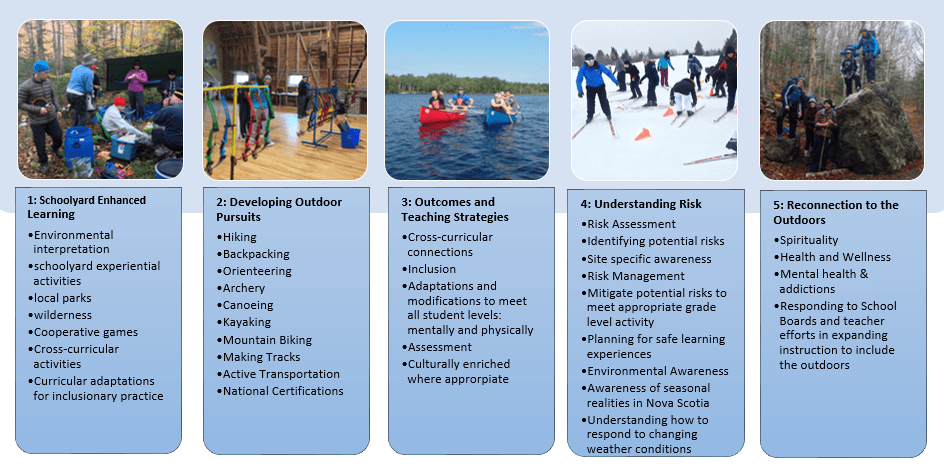Submit the Expression of Interest form to be notified about upcoming cohorts
The Certificate in Outdoor Education (COE) is a program that leads to a license upgrade for teachers who are interested in developing their capabilities to enact outdoor education practices across the Nova Scotian Public Schools Program P-12. The courses in the COE are designed to enhance teacher’s professional skill development in specialized areas of outdoor education, and to enhance the curricular awareness and teaching strategies associated with assessment practices, managing risk, inclusion, and learning in the outdoors. The program focuses upon five curricular themes:

Schoolyard Enhanced Learning
This theme is designed to help teachers who are responsible for delivering the public school curriculum in areas other than physical education to expand their current practices to include quality outdoor learning experiences. This theme focuses upon the learning potential that can be reached in and around their schools. It builds teacher’s awareness and confidence related to how and why to offer outdoor experiential learning opportunities to help broaden and deepen outcomes across a variety of subject areas.
Developing Outdoor Pursuits
This theme aims to increase the breadth of how youth are engaged in physical education activities by including outdoor activities that offer different experiences from traditional sports. Although outdoor education is one of five strands of physical education, most teachers need opportunities to develop greater confidence and skill to lead outdoor pursuits because of its absence from their pre-service teacher preparation programs. This thread helps to develop this professional skill base for teachers by attaining national or international standards in specific outdoor pursuits.* Furthermore, teachers learn how to build instructional strategies for each pursuit to ensure quality learning. They also learn to plan and monitor safety in each of the outdoor pursuits.
Outcomes and Teaching Strategies
The certificate helps teachers learn to develop cross-curricular units across a variety of subjects. They learn to develop assessment strategies that track student growth and performance improvement within outdoor activities. Furthermore, they learn to adapt and modify outdoor pursuits to ensure inclusionary practices for all abilities. The program introduces teachers to specific equipment modifications and lesson adaptations to lead students of all abilities outdoors. The program also includes First Nations perspectives along with multicultural connections and illustrates how particular outdoor activities have evolved to their present practice including technological innovations over time.
Understanding Risk
Teachers learn to plan for safe learning experiences and how to remain vigilant in their in-field risk assessment and `management practices. Curricular expectations for outdoor education P-12 also incorporate the new Nova Scotia Physical Education Safety Guidelines 2015. Each course has the teacher undergo a process of identifying potential risks as it pertains to grade level, activity, and teaching location. Teachers also learn how to prepare to manage risks that may occur.
Reconnection to the Outdoors
The outdoors helps youth connect to an active, nature-based lifestyle that for many may have become foreign to their learning experience, as much of North American society has moved towards a more sedentary lifestyle. Teachers learn the benefits of going outdoors for positive learning and how it has the potential to help foster improved self-esteem for youth contributing to better mental and physical heath.
*National Certifications (most certifications require a separate examination to meet national or international standards) required by the Nova Scotia Physical Education Safety Guidelines 2015:
- National Archery in the Schools Program (NASP)
- Canadian Red Cross: Wilderness and Remote First Aid—Advanced
- Paddle Canada: Introduction and Intermediate Lakewater, Waterfront Instructor, Sea Kayak Basic or Sea Kayak Skills I, Canoe Tripping I
- Outdoor Council of Canada: Field Leader (includes winter, navigation, overnight designations)
Each course includes learning outcomes related to:
1) The development and assessment of outdoor skills in support of outdoor education pursuits;
2) The development of teacher’s general and course-specific methodologies related to the teaching and assessment of outdoor pursuits in the public school system;
3) The ability to develop comprehensive unit plans supported by outcome specific lesson plans and assessment practices;
4) Year-long planning that targets progressive fundamental movement skills and seasonal realities in Nova Scotia;
5) Specialized training for outdoor safety, including certification to demonstrate competencies to meet current provincial physical education safety guidelines.
Tuition
Tuition rates for our program are subject to change. For more information on current tuition and related fees (listed under 'Part-Time and Per-Credit Fees') for this program, contact the Student Accounts Office at @email or phone 902-867-2123. Please note, the Certificate in Outdoor Education program is not eligible for any government student loan funding.
Contact
2nd Floor MacDonald Hall
2175 Varsity Drive
Antigonish NS B2G 2W5
Canada

